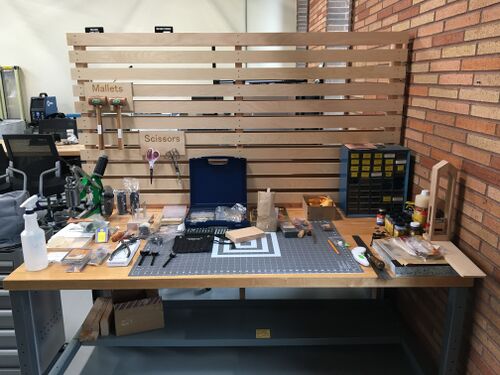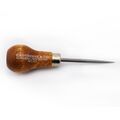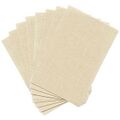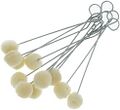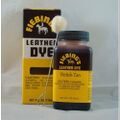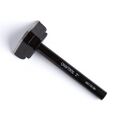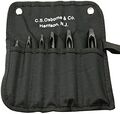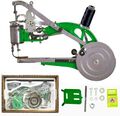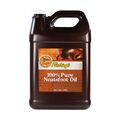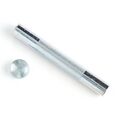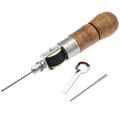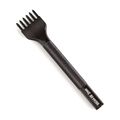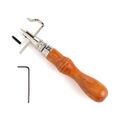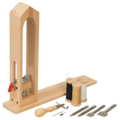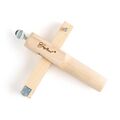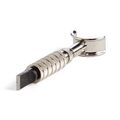Difference between revisions of "Leatherworking Station"
| Line 60: | Line 60: | ||
</gallery> | </gallery> | ||
| − | Vegetable-tanned leather is tanned with natural vegetable tannins to alter the protein structure of the hide, causing it to become leather. This type of leather typically takes a longer amount of time to create. It is considered higher quality in comparison to chrome-tanned leather. | + | '''Vegetable-tanned leather''' is tanned with natural vegetable tannins to alter the protein structure of the hide, causing it to become leather. This type of leather typically takes a longer amount of time to create. It is considered higher quality in comparison to chrome-tanned leather. Approximately 10% of all leather is vegetable-tanned. |
| − | Chrome-tanned leather uses chemicals to tan and is a faster, less costly process. Veg tan leather is typically thicker and more durable, while chrome tanned leather is thin and less durable. | + | '''Chrome-tanned leather''' uses chemicals to tan and is a faster, less costly process. Approximately 90% of all leather is chrome-tanned. |
| + | |||
| + | Veg tan leather is typically thicker and more durable, while chrome tanned leather is thin and less durable. | ||
'''Awl''' - An awl is a tool with a metal point used for marking, piercing, punching, or sewing leather. | '''Awl''' - An awl is a tool with a metal point used for marking, piercing, punching, or sewing leather. | ||
Revision as of 15:16, 16 February 2022
Make: Various
Model: Various
Serial Number: Various
Ace: Dane Ziegler (dziegler22@georgefox.edu).
Location: The Vault
Description
The Leatherworking Station
Documentation
Terminology
Vegetable-tanned leather is tanned with natural vegetable tannins to alter the protein structure of the hide, causing it to become leather. This type of leather typically takes a longer amount of time to create. It is considered higher quality in comparison to chrome-tanned leather. Approximately 10% of all leather is vegetable-tanned.
Chrome-tanned leather uses chemicals to tan and is a faster, less costly process. Approximately 90% of all leather is chrome-tanned.
Veg tan leather is typically thicker and more durable, while chrome tanned leather is thin and less durable.
Awl - An awl is a tool with a metal point used for marking, piercing, punching, or sewing leather.
Beveler - A beveler is a tool with a metal blade that is used to remove the square corners from the edges of leather goods.
Burnisher - A burnisher is used to smooth and harden the edges of leather. It is usually made of wood and smooths leather through applied friction and pressure.
Leather Glue - Make sure you are using glue that is specific for leather and suede.
Maul - A leather maul is a striking tool used for stamping, tooling, setting rivets, and more. It is made of a head and a handle, similar to a hammer and mallet.
Pricking Iron and Chisel - Pricking irons and chisels are tools that are used for marking and creating holes in leather. They are built with equally spaced metal points.
Punch - A leather punch is a hole punch specifically for making holes in leather. They are great for setting rivets or making holes in belts and collars.
Skiver - A leather skiver is a metal tool used to remove and shave thin layers of leather material off of the surface.
Stamp - Leather stamps are made of metal and are used to create designs on your leather’s surface.
Cutting Mat - Before cutting your leather with a utility blade or rotary cutter, set up your work surface with a cutting mat to protect the table.
Training
Operation
There are a wide variety of videos on ring making. The basic process is composed of 4 main steps:
Demonstration
Make a ring
General Procedure
Safety
Insert text
Certification
Troubleshooting
Maintenance
General maintenance
Insert text
Specific Maintenance Tasks
| Maintenance Procedure | Frequency | Done By |
|---|---|---|
| Sample | Sample | Sample |
